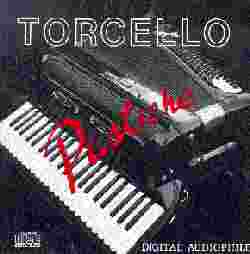
Program:
D. Scarlatti - Sonata in D Major
D. Scarlatti - Sonata in F Major
C. Daquin - Le Coucou
J.K.F. Fischer - Six Little Fugues in F Major
J.K.F. Fischer - Prelude and Fugue in E Minor
J.S. Bach - 'Sarabande' from English Sutie V in E Minor
J.S. Bach - 'Passepied 1 & 2' from English Suite V in E Minor
J.S. Bach - Jesu, Meine Freude - Prelude and Chorale
T. Lundquist - Partita Piccola - 3rd Mvt.
R Romiti - Introspection
J. Sorenson - Musette
A. Abbott - Automne
A. Abbott - Prelude 1
A. Abbott - Prelude 2
A. Abbott - Complainte
W. Jacobi - 'Fantasy' for Flute and Accordion
total time:45:42
released: 1987
label: Digital Audiophile
John Torcello Company
17100 Midwood Drive
Granada Hills, CA 91344
USA
Review by Steve Mobia
Here is a fine self-produced recording by John Torcello, an obviously talented accordionist living in Granada Hills California. His performance history includes serveral appearances with the LA Philharmonic of works by Kurt Weill, Alban Berg, David Del Tredici and more recently Mauricio Kagel's Orchestrion-Straat with Kagel himself conducting. This CD, made in l987 on what was then state of the art digital equipment, is very lifelike. Many recordings of accordion music add too much reverb or equalization distortion to get that big sound. Torcello's recording is refreshingly direct. It's very much as if he is in the room with you.
The first half of the album contains transcriptions of short pieces from the Baroque period although, as Torcello points out, he is simply playing the original scores on his free-bass accordion rather than rewriting the pieces. The second half contains a variety of contemporary pieces written for accordion. Both halves are excellently performed. Domenico Scarlatti's one-movement harpsichord sonatas are favorites for accordion transcription and come off very expressively despite the great differences between the instruments. Scarlatti wrote at least 555 of these works which exhibited brilliant technique and mastery of the rounded binary form. Here the regal "Sonata in D Major K.96" and the lilting "Sonata in F Major K.446" are paired. The catchy Le Coucou -- an early harpsichord work by child prot g Louis Daquin (1694-1772) -- is performed with assurance and lightness.
The little known composer Johann Kasper Ferdinand Fischer (1665-1746) foreshadowed Bach's 48 Preludes and Fugues with his own beautiful excursions into the form. Included here are Six Little Fugues in F major and a Prelude & Fugue in E minor. Torcello's free bass Giulietti brings them to life with clarity. J.S. Bach is represented in the next 3 tracks. From the English Suite 5 in E Minor Torcello performs the stately Sarabande and the quicker intricate Passepieds 1 & 2. The somber Prelude and Chorale from Jesu, Meine Freude concludes the baroque half of the album.
Here the miking as well as the content of the recording changes. For the next 3 tracks, Torcello exaggerates separation between the left and right manuals of the accordion. This is somewhat distracting (especially if wearing headphones) but certainly draws attention to the complex polyphony of what follows. Swedish composer Torbjorn Lundquist's piece is for me the high point of the album. His 3rd movement from Partita Piccola written in l965 is short but full of invention and humor. A real virtuoso performance, the vigorous melodic lines have an irrepressible energy and wit. I just wish the entire Partita Piccola had been performed. I believe this composition should be in the repertoire of all serious accordionists.
The fascinating Introspection by Richard Romitis is the only atonal piece on the album. Extended subtle stretches of single notes and chords are contrasted with fast scurrying eruptions. Torcello exhibits much impressive bellows control here. The piece sustains interest through constant creative surprise. Another polyphonic delight lies ahead with John Sorenson's Musette. Although this wild ride is too short, it certainly amazes the ears with its overlapping polyrhythmic patterns. The four lullaby-sweet pieces of French composer Alain Abbott are lyrically diatonic with the left hand gliding from chord to chord supporting the simple right hand melodies.
The longest and the only work for an additional instrument is Wolfgang Jacobi's lighhearted Fantasy for Flute and Accordion. It was written in collaboration with famed German accordionist Hugo Noth. Beginning in a propulsive rhythmic way, the pleasant melodic variations lead into a more softly flowing impressionistic section. The quick rhythms and opening theme return briefly to conclude the work. I would have liked more percussive accents on the chords at the beginning and end. Also the recording here tries for the opposite effect of earlier on. Instead of separation, the flute and accordion are squashed together in what sounds almost like mono, with the room tone coloring the sound. It has that "recital in the living room" effect contrasting the clean professionalism of the rest of the album.
This is a wonderfully varied compilation that should interest a broad audience of both classical and contemporary accordion music. I hope that Mr. Torcello decides to produce another album someday. He deserves a listen.
| About The Free-Reed Review |
| Invitation to Contributors / Submission Guidelines |
| Back to The Free-Reed Review Contents
Page |
| Back
to The Classical Free-Reed, Inc. Home Page |